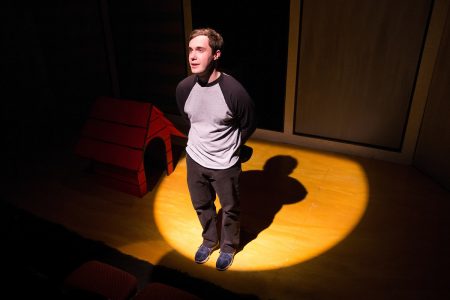Travis Byram ’18 makes debut as a playwright with Black Chicken

Travis Byram ’18 performs in Randolph’s production of Dog Sees God in 2017
Randolph College’s theatre department will premiere a staged reading of Black Chicken, written by Travis Byram ’18, on Friday, February 22, at 7:30 p.m. in the Lab Theatre (Room 203) of the Harold G. Leggett Building. The show is free and open to the public.
Black Chicken is the first play Byram has written, and will be performed by a cast of Randolph students. Kaya Clarke ’19, who acted alongside Byram in several Randolph theatre productions, is directing the staged reading as part of her Senior Capstone project.
“I read the play and fell in love with it, and I wanted to showcase it to the community,” Clarke said. “Getting to direct means the world to me, not only because I get to work with such amazing people, but because Randolph gave me this opportunity that I don’t think I would have anywhere else.”
We asked Byram several questions about the play and what he’s been up to since earning his degree in English last summer:
Tell us about Black Chicken. What’s it about and what was your inspiration for writing it?
“So the basic premise for Black Chicken is a young, atheist girl is tired of going to her heavily Christian middle school. She thinks she’s going to a regular high school next semester, but her parents are disturbed by her lack of faith, so they decide to send her into an even more religious Christian academy. Because she can’t face them and tell them she doesn’t believe in God, she lies and says she’s a lesbian, which is forbidden in the academy’s guidebook.
For my senior project, I knew I wanted to tackle religion. I grew up raised Methodist in a very kind, humble church. But I realized my upbringing was an exception, and that sometimes church can turn into an exclusive culture that breeds intolerance. By the time I was a teenager I stopped believing in a higher power, but still had love for the people that I got to meet in my time at my Methodist church. Even after all these years, religion is still a massive taboo to anyone who wants to write on it in a satirical way. At first I wanted to tackle churchgoing itself in a goofy way, but I realized honing in on one person in particular and making her a microcosm of the hypocrisy I was writing against was a better route.”
How did this opportunity come about?
“This was the first play I had ever written, and it was daunting. At a banquet for a ceremony, I was sitting next to [English professor Laura-Gray] Street, who told me I was being considered for the English Honors Program. I had taken classes with her before, and she knew that my college life was split between pursuing my English degree and going to rehearsal for the plays I was in. She wanted to see if I could find a happy medium and write a full length play for my honors project. I had never been so excited about the prospect of homework.
On Commencement day, [theatre professor] Stephanie Earl approached me about putting on Black Chicken for the Randolph stage. I was absolutely floored. Nothing much materialized in the summer to come, but then I got another email telling me that Kaya, who I’ve acted alongside twice now, was interested in using BC for her senior project, and that it was going to be a joint collaboration between my two worlds of theatre and English for a staged reading. That gesture was my entire life at Randolph, balancing these two worlds that I’d fallen in love with—one, my intended career, and the other, my passion.”
How many students and/or alums are involved in the production, and how many characters are in the story?
“There are five performers in BC, but there are 10 roles. Two people have three roles a piece, and one person has double duty. I wrote it like this not just for marketability (small casts sell better to anyone looking to write), but because Randi (my protagonist) sees religious people as being all alike. So, it works thematically and practically. Everyone in the cast—the director, actors, and stage manager—are all current students/Randolph alumni. I have many friends in the ensemble from past productions, but also a couple fresh faces that I can’t wait to see say the words of my eclectic characters!”
What else have you been up to since graduating? Are you writing other plays?
“After I graduated, I was offered a part in Bacchus Theatre Group’s Glass Menageire and performed that play in Lynchburg’s Aviary last August. Currently, I will soon be directing a one act for Stage Door productions in early April (my first time!) and will be appearing in Fredericksburg Theatre Ensemble’s Deathtrap next month as Clifford! I do have a play in the early stages I’m working on, inspired by an NPR episode I listened to about a pastor who went on tour with Slayer to try to get them to denounce their “satanic” ways. I love the idea of having a thematic religious trilogy of plays, like Clint Eastwood with his spaghetti westerns or Oliver Stone and his Vietnam War films.”
What does it mean to you to collaborate with Randolph on the play you wrote?
“I can thank my Randolph family for all of my writing success. I am a published poet because of the superb English faculty, and now this incredible honor. Professor [Gary] Dop, professor [Mara] Amster and Stephanie Earl led my honors committee, never letting me get too comfortable with my own prose and always offering insightful, sensitive commentary to my crass, offbeat comedy. I hope this reading does them proud, because this is far from my doing alone.”
Tags: alumni, English, Kaya Clarke, performing arts, Randolph College alumni, theatre, Travis Byram
